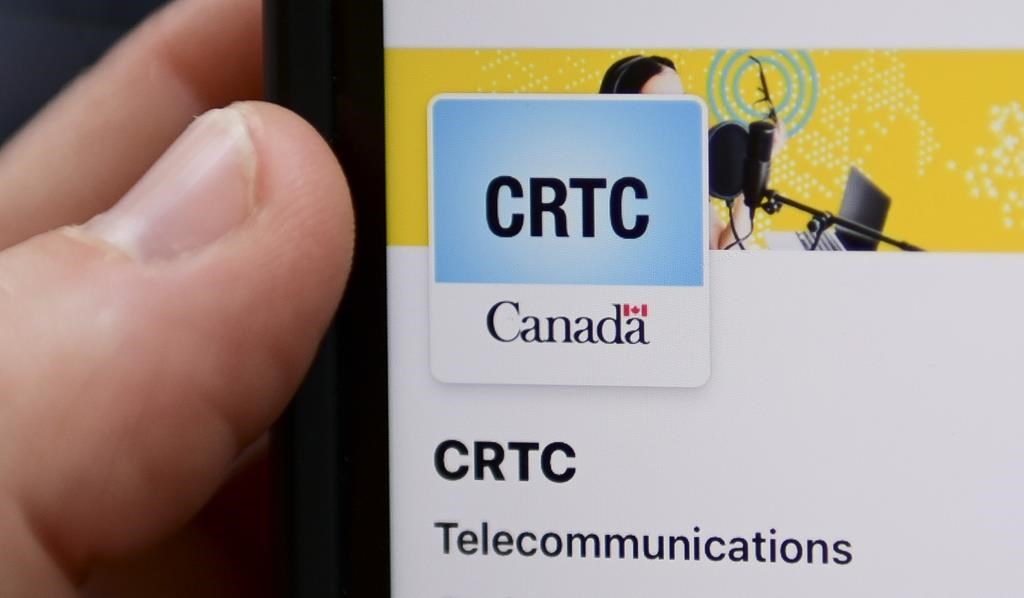
A person navigates to the online social media pages of the CRTC on a cellphone in Ottawa on Monday, May 17, 2021. THE CANADIAN PRESS/Sean Kilpatrick
The CRTC has rejected a request from Bell Canada and several independent internet providers for an expedited decision that would prevent major carriers from utilizing competitors' fiber networks to offer services to customers.
The regulator stated that the request, submitted in March, lacked sufficient evidence of irreparable harm.
Marc Morin, Secretary-General of the CRTC, communicated the decision in a letter to the coalition, which includes TekSavvy, Eastlink, Cogeco Communications Inc., and the Competitive Network Operators of Canada.
The companies argued that granting Canada's Big Three internet carriers access to each other's fiber networks, including Bell itself, would jeopardize the survival of independent internet service providers.
However, Morin noted the absence of adequate evidence supporting these claims.
Last November, the CRTC issued a provisional ruling mandating BCE Inc. (Bell's parent company) and Telus Corp. to grant competitors access to their fiber networks in Ontario and Quebec within six months. This allowed independent telecoms to utilize these networks to offer fiber service to their customers, aiming to promote internet service competition in Canada's largest provinces.
While these rules took effect recently, they are temporary, pending a broader review on internet competition by the CRTC. The regulator's consultation, which involved a five-day hearing in February, could potentially lead to the permanent implementation of these rules nationwide.
Morin expects the CRTC to reach a final decision on wholesale fiber access by the end of the summer. He emphasized that the temporary mandate would enhance competitive choices for Canadians, outweighing any potential harm identified by the applicants during the interim period.
Bell strongly opposed the CRTC's provisional decision, seeking its annulment since its issuance. The company has accused the CRTC of bias in its internet review, asserting that the current trajectory reduces Bell's incentive to expand its fiber network. In response to the provisional ruling, Bell reduced its network spending plans by $1.1 billion by 2025 and announced a nine percent reduction in its workforce earlier this year.
Although the Federal Court of Appeal denied Bell's request for a stay of the provisional decision in February, the company's appeal is pending. Additionally, Bell awaits a decision from the federal cabinet, which it petitioned to review the CRTC's action.
During the CRTC's hearing, Bell proposed conditions to mitigate potential negative consequences if the wholesale internet regime expanded. These conditions included restricting national wireless carriers' eligibility (Bell, Rogers Communications Inc., and Telus) to sell internet over competitors' fiber networks.
Bell argued that without such restrictions, larger players would rely on each other's networks, hindering their investment in expanding their own infrastructure. Despite the potential benefits to Bell, the company opposed this arrangement, fearing it would distort Canada's internet market in favor of major carriers.
Morin declined to rule on wholesale access eligibility independently, citing its close association with other issues under review. He emphasized that the access established under the temporary mandate might differ from the final decision, urging providers to assess associated risks.
CNOC president Paul Andersen criticized the CRTC's response, asserting that it contradicts the regulator's intent to foster competition. He argued that allowing large carriers to resell on each other's networks would reduce competition for high-speed internet services.
Independent internet providers, such as TekSavvy, highlighted the significance of wholesale access. They cited challenges faced due to the lack of regulatory safeguards against predatory pricing by major carriers.
Overall, the CRTC's rejection of an expedited decision underscores the complexities of the ongoing debate on wholesale fiber access and its implications for internet competition in Canada.















